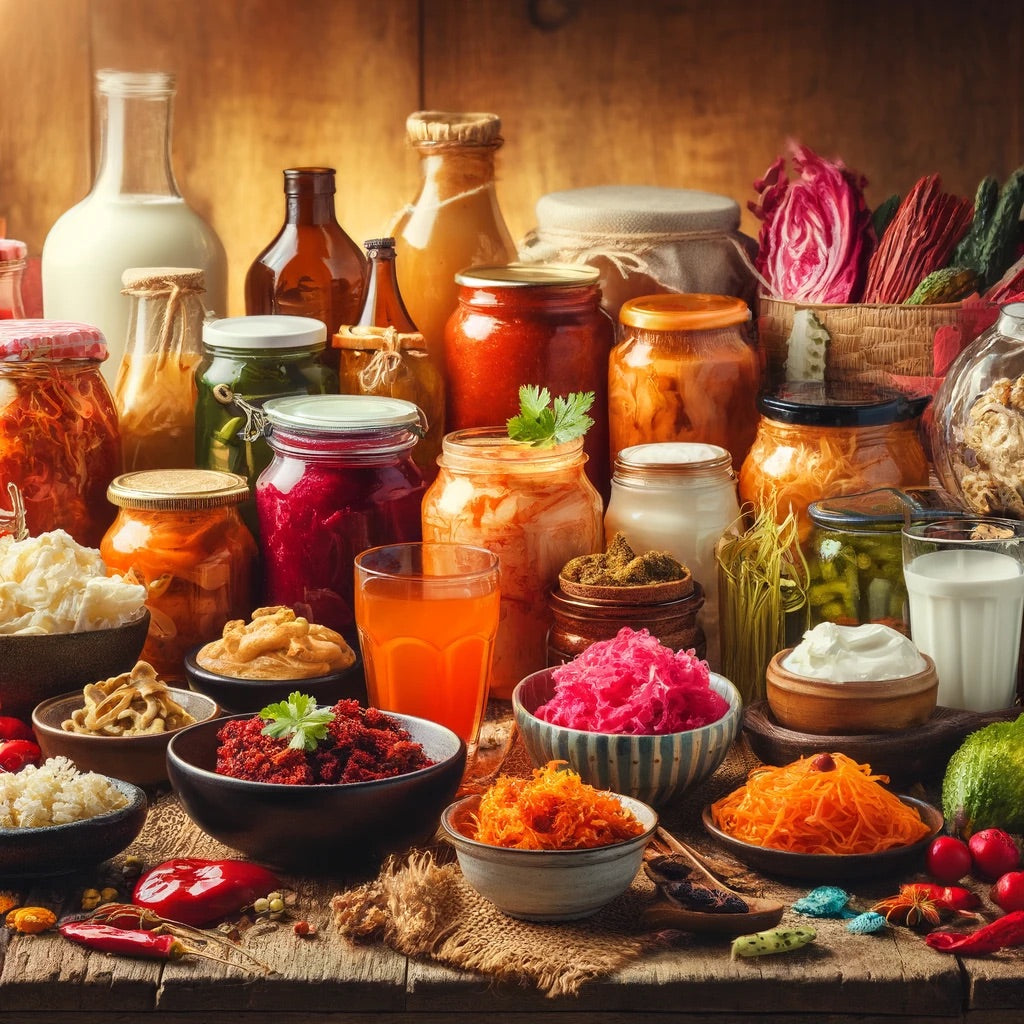
Fermented Foods: Exploring Gut-Boosting Delights Across Cultures
Share
When it comes to the world of culinary delights, few things possess the rich history, diverse flavors, and potential health benefits of fermented foods. From tangy sauerkraut to fizzy kombucha, fermented fare has been cherished across cultures for centuries, not only for its distinctive taste but also for its remarkable impact on health and wellness. In this article, we'll delve into the captivating world of fermented foods, exploring their cultural roots, gut-friendly qualities, and inspiring flavors that tantalize taste buds while nourishing the body.
Fermentation: A Time-Honored Tradition
Fermentation is a culinary tradition that spans continents and cultures throughout the history of human civilization. Dating back thousands of years, fermentation was initially used as a means of food preservation. This process allowed ancient communities to store food for longer periods, especially during times when fresh produce was scarce. By transforming raw ingredients into nutrient-rich, shelf-stable products, fermentation played a crucial role in the survival and sustenance of early societies.
As time progressed, the health-promoting properties of fermented foods began to be recognized and appreciated. Today, this ancient practice continues to thrive, with fermented foods gracing tables around the globe. From the tangy sauerkraut of Germany to the spicy kimchi of Korea, these foods are celebrated not only for their unique flavors but also for their remarkable impact on health and wellness. The revival of interest in traditional food preparation methods has brought fermentation back into the spotlight, highlighting its importance in both culinary and health contexts.

Cultural Significance
Fermentation is a culinary tradition that spans continents and cultures throughout the history of human civilization. Dating back thousands of years, fermentation was initially used as a means of food preservation before its health-promoting properties were fully realized. This method allowed people to store food for extended periods, especially during harsh winters or times of scarcity, by transforming perishable items into more stable, longer-lasting forms. The process involves the action of microorganisms like bacteria, yeast, and molds, which break down carbohydrates in the food, resulting in unique flavors, textures, and enhanced nutritional profiles.
Today, this ancient practice continues to thrive, with fermented foods gracing tables around the globe. From the tangy sauerkraut of Germany to the spicy kimchi of Korea, the creamy yogurt of Greece to the effervescent kombucha of China, these foods are celebrated not only for their distinctive tastes but also for their remarkable health benefits. Fermentation has seen a resurgence in popularity in modern times, driven by a growing interest in natural, traditional food preparation methods and a greater understanding of the gut health benefits provided by probiotics found in fermented foods. This global culinary renaissance highlights the enduring significance and versatility of fermentation, bridging ancient traditions with contemporary wellness trends.
Gut Health Benefits
One of the most compelling reasons to incorporate fermented foods into your diet is their profound impact on gut health. Scientific research has provided valuable insights into the gut health benefits of probiotic-rich aka fermented foods, shedding light on the mechanisms by which these foods support digestive wellness. Here are some key scientific findings:
- Microbiome Modulation: Fermented foods can positively influence the composition and diversity of the gut microbiome. Studies have shown that regular consumption of probiotic-rich foods can increase the abundance of beneficial bacteria, such as Lactobacillus and Bifidobacterium, while reducing the levels of harmful bacteria. This modulation of the gut microbiome contributes to a more balanced microbial community, which is associated with improved digestion and overall gut health.
- Immune Regulation: The gut microbiome plays a crucial role in regulating immune function, and fermented foods can help support a robust immune response. Research has demonstrated that probiotics can stimulate the production of immunoglobulins and cytokines, which are key components of the immune system. By enhancing immune function, probiotics may help protect against infections, reduce inflammation, and promote overall health and well-being.
- Intestinal Barrier Function: Fermented foods have been shown to support the integrity of the intestinal barrier, which serves as a protective barrier between the gut lumen and the bloodstream. Studies suggest that probiotics can strengthen the tight junctions between intestinal cells, preventing the leakage of harmful substances into the bloodstream. This preservation of intestinal barrier function is essential for preventing leaky gut syndrome and associated health issues.
- Digestive Health: Fermented foods can promote digestive health by enhancing nutrient absorption, reducing gastrointestinal discomfort, and alleviating symptoms of digestive disorders such as irritable bowel syndrome (IBS) and inflammatory bowel disease (IBD). Research indicates that probiotics may help regulate bowel movements, reduce bloating and gas, and improve overall digestive function.
- Mental Health and Brain Function: Emerging evidence suggests a connection between gut health and mental health, often referred to as the gut-brain axis. Fermented foods may exert beneficial effects on mood, cognition, and stress response by modulating neurotransmitter production, reducing inflammation, and influencing communication between the gut and the brain. While more research is needed to fully understand this complex relationship, preliminary studies suggest that probiotics may have a role in supporting mental well-being.
Nutritional Value
In addition to their probiotic content, fermented foods are packed with essential nutrients that nourish the body and tantalize the taste buds. From vitamins and minerals to enzymes and bioactive compounds, these culinary creations are a treasure trove of nutritional goodness. Whether you're savoring the tangy crunch of sauerkraut or indulging in the creamy richness of yogurt, you're treating your body to a bounty of healthful delights. The rise in sourdough bread is largely due to the fermentation process. Our Pharmer bread takes three days to make and has a light fermentation process while it sits in the fridge.

Shop Pharmer Bread
Tips for Incorporation
Incorporating fermented foods into your diet is easier than you might think. Start by experimenting with small servings of kimchi, sauerkraut, or miso and gradually increase your intake as your taste buds acclimate. Get creative in the kitchen by adding fermented veggies to salads, sandwiches, and stir-fries, or whip up a refreshing smoothie with kefir or yogurt. With a little imagination and a dash of culinary flair, you can elevate your meals with the vibrant flavors of fermented fare.
Safety Considerations
While fermented foods offer a host of health benefits, it's essential to approach them with care. When fermenting foods at home, follow proper sanitation practices to prevent contamination and ensure safety. Be mindful of allergens and potential side effects, especially if you have sensitivities to certain ingredients. When in doubt, consult with a healthcare professional or nutrition expert for personalized guidance.
Embrace the Fermented Feast
Fermented foods are more than just a culinary indulgence—they're a cornerstone of vibrant health and well-being. Whether you're savoring the tang of kimchi or relishing the fizz of kombucha, each bite is a celebration of culture, flavor, and nourishment. So why not embrace the fermented feast and embark on a culinary journey that delights the senses while supporting your health from the inside out? With each delicious bite, you'll be nourishing your body, nurturing your gut, and savoring the vibrant flavors of fermented fare. Cheers to your health and happiness!

About Author: Stephanie is the current fulfillment director and kitchen supervisor for Organic Pharmer. She studied Neuroscience at University of California, Irvine before studying Naturopathic Medicine for 2 years at National University of Natural Medicine in Portland, Oregon. She also spent 3 years studying East Asian Medicine at the same university.
